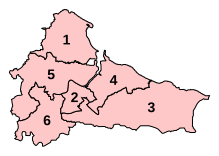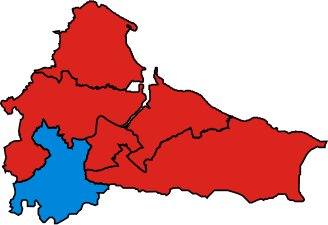List of parliamentary constituencies in Cleveland
Constituencies
| Constituency[nb 1] | Electorate[1] | Majority[2][nb 2] | Member of Parliament[2] | Nearest opposition[2] | Electoral wards[3][4] | Map | ||
|---|---|---|---|---|---|---|---|---|
| Hartlepool BC | 70,855 | 6,940 | Jill Mortimer† | Paul Williams‡ | Hartlepool Borough Council : Brus, Burn Valley, Dyke House, Elwick, Fens, Foggy Furze, Grange, Greatham, Hart, Owton, Park, Rift House, Rossmere, St Hilda, Seaton, Stranton, Throston.
|
 | ||
| Middlesbrough BC | 60,764 | 8,390 | Andy McDonald‡ | Ruth Betson† | Middlesbrough Borough Council : Acklam, Ayresome, Beckfield, Beechwood, Brookfield, Clairville, Gresham, Kader, Linthorpe, Middlehaven, North Ormesby and Brambles Farm, Pallister, Park, Thorntree, University.
|
 | ||
| Middlesbrough South and East Cleveland CC | 72,348 | 11,626 | Simon Clarke† | Lauren Dingsdale‡ | Middlesbrough Borough Council: Coulby Newham, Hemlington, Ladgate, Marton, Marton West, Nunthorpe, Park End, Stainton and Thornton. Redcar and Cleveland Borough Council : Brotton, Guisborough, Hutton, Lockwood, Loftus, Saltburn, Skelton, Westworth.
|
 | ||
| Redcar BC | 66,864 | 3,527 | Jacob Young† | Anna Turley‡ | Redcar and Cleveland Borough Council: Coatham, Dormanstown, Eston, Grangetown, Kirkleatham, Longbeck, Newcomen, Normanby, Ormesby, St Germain's, South Bank, Teesville, West Dyke, Zetland. |  | ||
| Stockton North BC | 66,649 | 1,027 | Alex Cunningham‡ | Steven Jackson† | Stockton-on-Tees Borough Council : Billingham Central, Billingham East, Billingham North, Billingham South, Billingham West, Hardwick, Newtown, Northern Parishes, Norton North, Norton South, Norton West, Roseworth, Stockton Town Centre, Western Parishes.
|
 | ||
| Stockton South BC | 76,870 | 5,260 | Matt Vickers† | Paul Williams‡ | Stockton-on-Tees Borough Council : Bishopsgarth and Elm Tree, Eaglescliffe, Fairfield, Grangefield, Hartburn, Ingleby Barwick East, Ingleby Barwick West, Mandale and Victoria, Parkfield and Oxbridge, Stainsby Hill, Village, Yarm.
|
 | ||
2010 boundary changes
Under the
| Name | Boundaries 1997-2010 | Boundaries 2010–present |
|---|---|---|
 |
 |
Proposed boundary changes
See 2023 Periodic Review of Westminster constituencies for further details.
Following the abandonment of the
The commission has proposed that the four unitary authorities which make up the former county of Cleveland be combined with the
The following seats are proposed:
Containing electoral wards in Hartlepool
Containing electoral wards in Middlesbrough
Containing electoral wards in Redcar and Cleveland
- Middlesbrough South and East Cleveland (part)
- Redcar
Containing electoral wards in Stockton-on-Tees
- Middlesbrough and Thornaby East (part)
- Stockton North
- Stockton West (part also in Darlington)
Results history
Primary data source: House of Commons research briefing - General election results from 1918 to 2019[8]
2019
The number of votes cast for each political party who fielded candidates in constituencies comprising Cleveland in the 2019 general election were as follows:
| Party | Votes | % | Change from 2017 | Seats | Change from 2017 |
|---|---|---|---|---|---|
| Conservative | 112,092 | 43.5% | 3 | ||
| Labour | 104,691 | 40.6% | 3 | ||
| Liberal Democrats | 10,452 | 4.1% | 0 | 0 | |
| Greens | 2,257 | 0.9% | 0 | 0 | |
Brexit
|
19,837 | 7.7% | new | 0 | 0 |
| Others | 8,465 | 3.2% | 0 | 0 | |
| Total | 257,794 | 100.0 | 6 |
Percentage votes
| Election year | 1983 | 1987 | 1992 | 1997 | 2001 | 2005 | 2010 | 2015 | 2017 | 2019 |
|---|---|---|---|---|---|---|---|---|---|---|
| Conservative | 35.8 | 33.8 | 37.1 | 25.2 | 26.3 | 23.0 | 27.7 | 29.0 | 38.8 | 43.5 |
| Labour | 37.9 | 44.7 | 50.0 | 62.4 | 59.5 | 51.9 | 39.9 | 43.3 | 53.8 | 40.6 |
| Liberal Democrat1 | 26.2 | 20.9 | 12.8 | 9.8 | 12.4 | 19.3 | 21.4 | 5.3 | 2.6 | 4.1 |
| Green Party | - | * | * | * | * | * | - | 2.3 | 0.4 | 0.9 |
| UKIP | - | - | - | * | * | * | 4.3 | 17.9 | 4.2 | * |
Brexit Party
|
- | - | - | - | - | - | - | - | - | 7.7 |
| Other | 0.1 | 0.6 | 0.2 | 2.6 | 1.8 | 5.8 | 6.7 | 2.2 | 0.2 | 3.2 |
11983 & 1987 - SDP-Liberal Alliance
* Included in Other
Seats
| Election year | 1983 | 1987 | 1992 | 1997 | 2001 | 2005 | 2010 | 2015 | 2017 | 2019 |
|---|---|---|---|---|---|---|---|---|---|---|
| Conservative | 1 | 2 | 2 | 0 | 0 | 0 | 1 | 1 | 1 | 3 |
| Labour | 4 | 4 | 4 | 6 | 6 | 6 | 4 | 5 | 5 | 3 |
| Liberal Democrat1 | 1 | 0 | 0 | 0 | 0 | 0 | 1 | 0 | 0 | 0 |
| Total | 6 | 6 | 6 | 6 | 6 | 6 | 6 | 6 | 6 | 6 |
11983 & 1987 - SDP-Liberal Alliance
Maps
-
1983
-
1987
-
1992
-
1997
-
2001
-
2005
-
2010
-
2015
-
2017
-
2019
-
2021
Historical representation by party
Conservative Labour Liberal Democrats Social Democratic
| Constituency | 1983 | 1987 | 91 | 1992 | 1997 | 2001 | 04 | 2005 | 2010 | 12 | 2015 | 2017 | 2019 | 21 |
|---|---|---|---|---|---|---|---|---|---|---|---|---|---|---|
| Hartlepool | Leadbitter
|
Mandelson | Wright | Hill | Mortimer | |||||||||
| Middlesbrough | Bell | McDonald | ||||||||||||
| Stockton North | Cook | Cunningham | ||||||||||||
| Redcar | Tinn | Mowlam | Baird | Swales | Turley | Young | ||||||||
| Langbaurgh / Middlesbrough South and East Cleveland (1997) | Holt | Kumar
|
Bates | Kumar | Blenkinsop | Clarke | ||||||||
| Stockton South | Wrigglesworth | Devlin | Taylor | Wharton
|
Williams
|
Vickers | ||||||||
See also
- List of parliamentary constituencies in the North East (region)
- History of parliamentary constituencies and boundaries in Cleveland
Notes
References
- ^ Baker, Carl; Uberoi, Elise; Cracknell, Richard (28 January 2020). "General Election 2019: full results and analysis". Commons Library. Retrieved 23 April 2020.
- ^ a b c "Constituencies A-Z - Election 2019". BBC News. Retrieved 23 April 2020.
- ^ "The Parliamentary Constituencies (England) Order 2007, page 4". Office of Public Sector Information. Crown copyright. 13 June 2007. Retrieved 7 November 2009.
- Boundary Commission for Englandpp. 1004–1007
- ^ "2023 Review | Boundary Commission for England". boundarycommissionforengland.independent.gov.uk. Retrieved 13 October 2021.
- ^ "Political boundaries across the North East could change - here's what it could mean for you". The Northern Echo. Retrieved 13 December 2022.
- ^ "The 2023 Review of Parliamentary Constituency Boundaries in England – Volume one: Report | Boundary Commission for England". boundarycommissionforengland.independent.gov.uk. paras 686-698. Retrieved 9 July 2023.
- ^ Watson, Christopher; Uberoi, Elise; Loft, Philip (17 April 2020). "General election results from 1918 to 2019". Retrieved 3 May 2020.








